Dacia Duster vs Ford Puma - Differences and prices compared
Compare performance (158 HP vs 168 HP), boot space and price (16300 £ vs 24800 £) at a glance. Find out which car is the better choice for you – Dacia Duster or Ford Puma?
Costs and Efficiency:
When it comes to price and running costs, the biggest differences usually appear. This is often where you see which car fits your budget better in the long run.
Dacia Duster has a significantly advantage in terms of price – it starts at 16300 £, while the Ford Puma costs 24800 £. That’s a price difference of around 8494 £.
Fuel consumption also shows a difference: Dacia Duster manages with 4.70 L and is therefore slightly more efficient than the Ford Puma with 5.40 L. The difference is about 0.70 L per 100 km.
Engine and Performance:
Power, torque and acceleration say a lot about how a car feels on the road. This is where you see which model delivers more driving dynamics.
When it comes to engine power, the Ford Puma has a barely noticeable edge – offering 168 HP compared to 158 HP. That’s roughly 10 HP more horsepower.
In acceleration from 0 to 100 km/h, the Ford Puma is noticeable quicker – completing the sprint in 7.40 s, while the Dacia Duster takes 9.40 s. That’s about 2 s faster.
In terms of top speed, the Ford Puma performs to a small extent better – reaching 210 km/h, while the Dacia Duster tops out at 180 km/h. The difference is around 30 km/h.
There’s also a difference in torque: Ford Puma pulls distinct stronger with 290 Nm compared to 230 Nm. That’s about 60 Nm difference.
Space and Everyday Use:
Whether family car or daily driver – which one offers more room, flexibility and comfort?
Both vehicles offer seating for 5 people.
In curb weight, Ford Puma is slight lighter – 1316 kg compared to 1377 kg. The difference is around 61 kg.
In terms of boot space, the Ford Puma offers barely noticeable more room – 523 L compared to 517 L. That’s a difference of about 6 L.
In maximum load capacity, the Dacia Duster performs distinct better – up to 1609 L, which is about 326 L more than the Ford Puma.
When it comes to payload, Ford Puma barely noticeable takes the win – 469 kg compared to 453 kg. That’s a difference of about 16 kg.
Who wins the race?
The Ford Puma proves to be dominates this comparison and therefore becomes our DriveDuel Champion!
Ford Puma is the better all-rounder in this comparison.
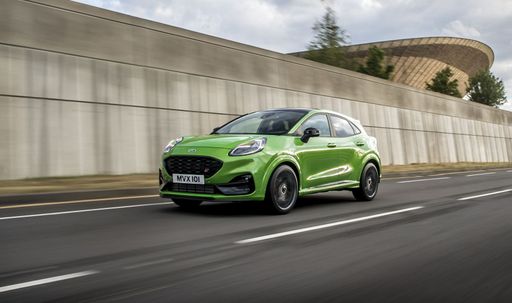
Ford Puma
Costs and Consumption
View detailed analysis
Engine and Performance
View detailed analysis
Dimensions and Body
View detailed analysis
Dacia Duster
The Dacia Duster is a no-nonsense compact SUV that delivers rugged practicality and surprisingly comfortable everyday driving without fuss. It might not win any beauty contests, but its honest design, easy-to-live-with cabin and tough attitude make it a smart pick for buyers who want reliable transport without luxury frills.
details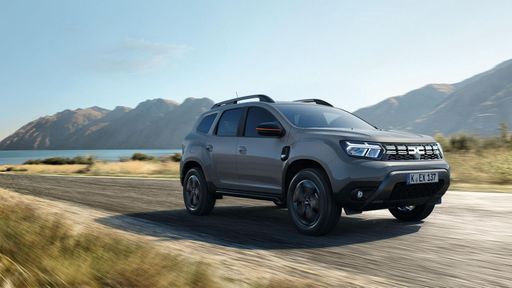
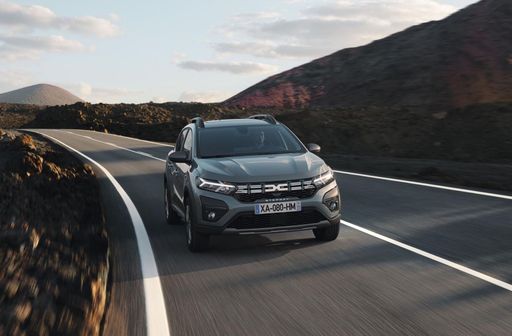
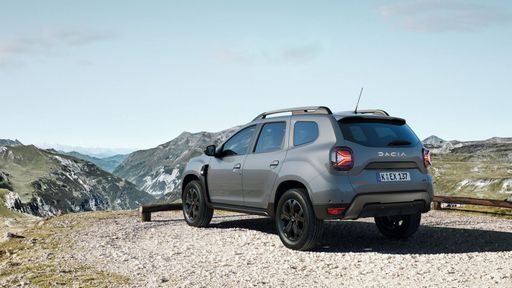
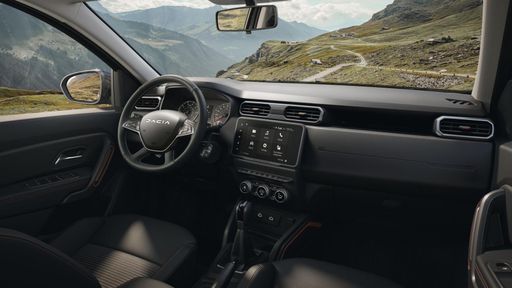
Ford Puma
The Ford Puma is a cheeky compact crossover that blends sporty styling with city-friendly practicality, giving drivers a surprisingly fun and composed ride. With clever storage tricks and a lively personality, it’s a smart pick for buyers who want enjoyment without fuss.
details
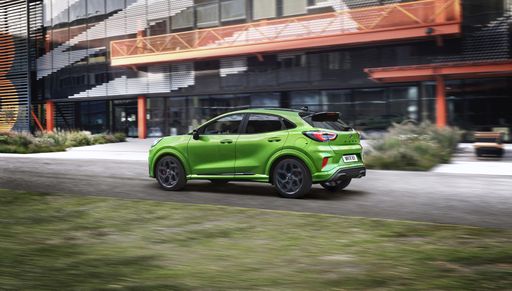
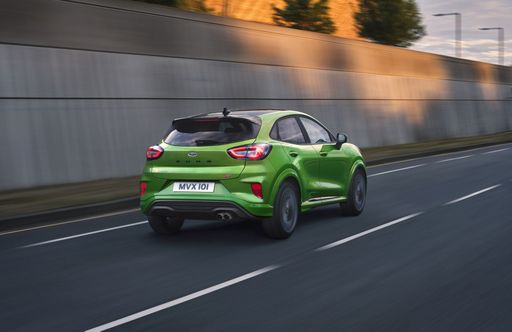
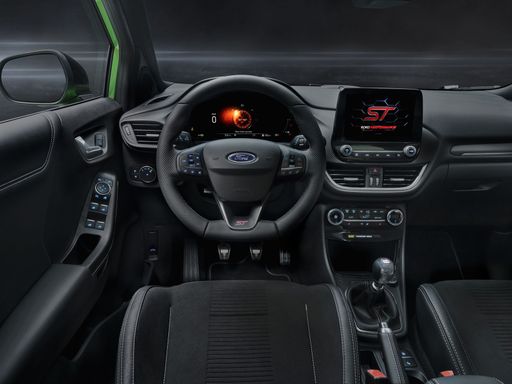

|

|
|
|
|
Costs and Consumption |
|
|---|---|
|
Price
16300 - 24900 £
|
Price
24800 - 36300 £
|
|
Consumption L/100km
4.7 - 7.5 L
|
Consumption L/100km
5.4 - 5.9 L
|
|
Consumption kWh/100km
-
|
Consumption kWh/100km
13.1 - 13.9 kWh
|
|
Electric Range
-
|
Electric Range
361 - 376 km
|
|
Battery Capacity
0.60 kWh
|
Battery Capacity
43 kWh
|
|
co2
107 - 124 g/km
|
co2
0 - 135 g/km
|
|
Fuel tank capacity
50 L
|
Fuel tank capacity
42 L
|
Dimensions and Body |
|
|---|---|
|
Body Type
SUV
|
Body Type
SUV
|
|
Seats
5
|
Seats
5
|
|
Doors
5
|
Doors
5
|
|
Curb weight
1377 - 1455 kg
|
Curb weight
1316 - 1563 kg
|
|
Trunk capacity
348 - 517 L
|
Trunk capacity
456 - 523 L
|
|
Length
4343 mm
|
Length
4186 - 4226 mm
|
|
Width
1813 mm
|
Width
1805 mm
|
|
Height
1656 - 1659 mm
|
Height
1550 - 1555 mm
|
|
Max trunk capacity
1414 - 1609 L
|
Max trunk capacity
1216 - 1283 L
|
|
Payload
450 - 453 kg
|
Payload
367 - 469 kg
|
Engine and Performance |
|
|---|---|
|
Engine Type
Petrol MHEV, Full Hybrid, LPG
|
Engine Type
Electric, Petrol MHEV
|
|
Transmission
Manuel, Automatic
|
Transmission
Automatic, Manuel
|
|
Transmission Detail
Manual Gearbox, Automated Manual, Dual-Clutch Automatic
|
Transmission Detail
Reduction Gearbox, Manual Gearbox, Dual-Clutch Automatic
|
|
Drive Type
Front-Wheel Drive, All-Wheel Drive
|
Drive Type
Front-Wheel Drive
|
|
Power HP
115 - 158 HP
|
Power HP
125 - 168 HP
|
|
Acceleration 0-100km/h
9.4 - 11.6 s
|
Acceleration 0-100km/h
7.4 - 9.8 s
|
|
Max Speed
180 km/h
|
Max Speed
160 - 210 km/h
|
|
Torque
190 - 230 Nm
|
Torque
170 - 290 Nm
|
|
Number of Cylinders
3 - 4
|
Number of Cylinders
3
|
|
Power kW
84 - 116 kW
|
Power kW
92 - 124 kW
|
|
Engine capacity
1199 - 1789 cm3
|
Engine capacity
999 cm3
|
General |
|
|---|---|
|
Model Year
2025
|
Model Year
2025
|
|
CO2 Efficiency Class
D, C
|
CO2 Efficiency Class
A, D
|
|
Brand
Dacia
|
Brand
Ford
|
What drivetrain options does the Dacia Duster have?
The Dacia Duster is offered with Front-Wheel Drive or All-Wheel Drive.
The prices and data displayed are estimates based on German list prices and may vary by country. This information is not legally binding.
